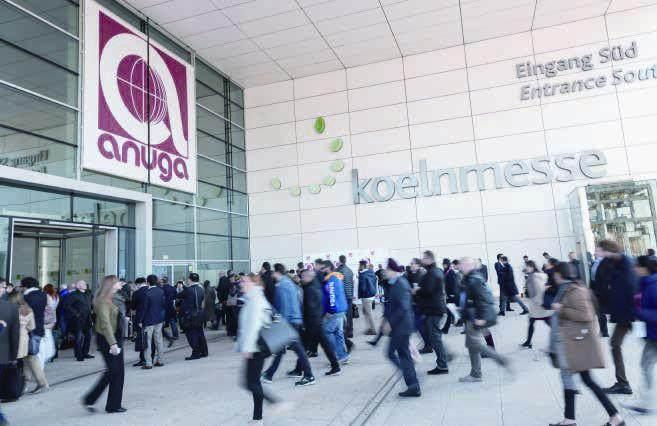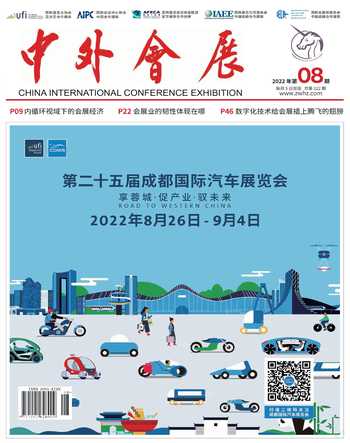Explore Ways-out for the Future
Fu Bingbing

Were very honoured to have Mr. Gerald B?se, the president and CEO of the global wellknown Koelnmesse with us for our todays interview to share his insights into their ways-out for our current exhibition industry faced with the difficulties amid the pandemic crisis.
The opportunity seized for recovery
“Koelnmesse is the expert partner in all areas associated with trade fairs and events— both in Cologne and worldwide. We are the no. 3 trade fair venue in Germany and into the top ten worldwide, organising about 80 trade fairs, exhibitions, guest events, and special events every year in Cologne and in the key markets all over the world –if there is no pandemic happening at the time. We offer our clients 11 trade fair halls with almost 400,000 m2 of exhibition space and outdoor areas. Up until 2020, we welcomed around 54,000 exhibiting companies from 122 countries and around 3 million visitors a year. Koelnmesses key areas of expertise are food and food technology, furnishings as well as digital media, entertainment, and mobility. We also have offices in Beijing, Shanghai, and Guangzhou. Our portfolio includes ANUFOOD China, China International Hardware Show and interzum Guangzhou,” says Gerald B?se.
Gerald B?se comments that their industry was hit hard by recent global events. In the wake of the pandemic, they quickly developed their safety concept#B-SAFE4business, which addressed the limitations in connection with the spread of the coronavirus. Thanks to effective protective measures, the concept made it possible for trade fairs to be held.
At the same time, at Koelnmesse, they have always focused on preparing a successful re-start: this vision became a reality in autumn 2021. Both in Cologne as well as internationally, they have been able to hold events that were not possible in 2020 and earlier in 2021. “Our advantage surely was that during the pandemic crisis, we took the opportunity to focus our efforts on a MODERN TRADE FAIR ERA, as we like to call it. Investments were partially repurposed, but not stopped. And we have always stayed prepared and have kept our team intact so we can do trade fairs again as soon as humanly possible. This is now set to pay off.” adds Gerald B?se with delight.
Industry reshaped amid pandemic
Gerald B?se tells the reporter that up to now, the trade fair industry has de facto been on the losers side: massive declines in turnover for the third year in a row and losses in the millions for major companies, including Koelnmesse.
“In spring 2020, we had no idea in what way the virus would hit our industry worldwide. First, we recycled old hygiene concepts from the times of SARS and avian flu. In February 2020, during our confectionery fair, the first face masks appeared.”sighs Gerald B?se, “In all our activities, we were always dependent on the guidelines of policy makers and the requirements of the authorities. Unfortunately, we were not really on their radar. Trade fairs were classed with major events such as fun fairs, sporting events and rock concerts. This has had a decisive impact not only on trade fair operations, but also on the basic mood and the attitude of our customers towards our events.” he says.
In addition, these developments have had quite an impact: in 2020, only 17 of 75 planned events in Koelnmesses programme took place worldwide. In 2021, 68 were planned and 34 took place. Now, in 2022,the situation has improved.
“Although some markets are still struggling due to their national situation, we are seeing the industry recover in many regions. As the autumn and spring trade fairs held at the turn of the year 2021/22 have demonstrated, trade fairs can even be held at international level under conditions that are safe for everyone involved. Our company is committed to making up for postponed events in 2022 and getting its business back on track.”explains Gerald B?se.
“At the same time, the hybridization of trade fairs and business models on the basis of new digital products is advancing. Koelnmesse purposely focuses on these products in an effort to put them to profitable use on behalf of customers in the years to come, while at the same time significantly increasing global reach. Future hybrid formats will also create new demands for the spatial structure of our grounds, which is why Koelnmesse continues to adhere to its modernization and investment plans in order to ensure its competitiveness.”
The future remains hybrid events
According to Gerald B?se Koelnmesses big theme for the future is hybridization. They are focusing on adding value through digital offerings. This includes, for example, 365-day platforms that open up new opportunities for their customers between two trade fair slots. But it also means expanding their digital services to increase their international reach, even when travelling is difficult. This reach will benefit their customers. However, hybridization also means using digital offerings to make the physical visit of the trade fair more eventful and successful. “This brings me to the most important point that the basis of our business continues to be physical interaction of people. Even in the next 10 or 20 years. Nothing will change about that. Our clients said that digital trade fairs were lacking one thing in particular: emotions. Despite all the success of our digital services, the feedback from the industry has been unanimous and unchanged: ‘We need to get back into the exhibition halls! The live experience cannot be replaced.” Gerald B?se underlines, “From this basis, we have delivered and developed new digital products that help our customers and that also sell. The second important cornerstone of the future trade fair is sustainability. Thats why we signed up to the Net Zero Carbon Initiative of UFI, the Global Association of the Exhibition Industry, in November 2021, committing to the goal of leaving a net zero CO2 footprint with our events by 2050. However, we will not wait until 2050 to do this, but, together with our customers, move forward much sooner.

Gerald B?se says that 2022 will be a decisive year for the trade fair industry. They are planning to carry out all scheduled trade fairs. Whether or not this will be possible depends on a number of factors like the further course of the pandemic, the travel opportunities and the recovery of the relevant markets. “The confidence of our customers in us as organisers and in the return of trade fairs, perhaps in partly new formats. The will to act on the part of policy makers and their recognition of the importance of the trade fair industry for the sustainable recovery of the global event network. And finally, our own entrepreneurial belief in the future. ” adds Gerald B?se
“At Koelnmesse, there have been three aspects of utmost priority: 1.We continue to be ready for operation in order to organise trade fairs again as soon as possible. 2.We keep our entire team, which we will soon need to overcome the consequences of the crisis. 3.We are looking for opportunities in this crisis to improve ourselves and our trade fairs and to prepare them for the future. The wheel cannot be turned back. In the end, the pandemic has only accelerated the digital transformation of the trade fair industry that had been in the offing for a long time. We have learned to integrate digital elements into our portfolio and to optimise them for our customers. Our strategic focus is on increasing the digital reach; hybrid events, also over longer periods of time, are the future. ” Gerald B?se states.

